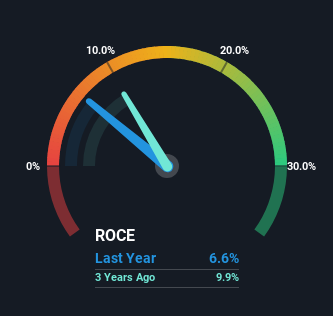- Israel
- /
- Oil and Gas
- /
- TASE:EQTL
There Are Reasons To Feel Uneasy About Equital's (TLV:EQTL) Returns On Capital
What trends should we look for it we want to identify stocks that can multiply in value over the long term? Firstly, we'll want to see a proven return on capital employed (ROCE) that is increasing, and secondly, an expanding base of capital employed. Put simply, these types of businesses are compounding machines, meaning they are continually reinvesting their earnings at ever-higher rates of return. However, after investigating Equital (TLV:EQTL), we don't think it's current trends fit the mold of a multi-bagger.
What Is Return On Capital Employed (ROCE)?
Just to clarify if you're unsure, ROCE is a metric for evaluating how much pre-tax income (in percentage terms) a company earns on the capital invested in its business. Analysts use this formula to calculate it for Equital:
Return on Capital Employed = Earnings Before Interest and Tax (EBIT) ÷ (Total Assets - Current Liabilities)
0.066 = ₪1.5b ÷ (₪25b - ₪2.2b) (Based on the trailing twelve months to September 2023).
So, Equital has an ROCE of 6.6%. Ultimately, that's a low return and it under-performs the Oil and Gas industry average of 16%.
View our latest analysis for Equital

Historical performance is a great place to start when researching a stock so above you can see the gauge for Equital's ROCE against it's prior returns. If you're interested in investigating Equital's past further, check out this free graph covering Equital's past earnings, revenue and cash flow.
What Does the ROCE Trend For Equital Tell Us?
On the surface, the trend of ROCE at Equital doesn't inspire confidence. Around five years ago the returns on capital were 12%, but since then they've fallen to 6.6%. Although, given both revenue and the amount of assets employed in the business have increased, it could suggest the company is investing in growth, and the extra capital has led to a short-term reduction in ROCE. If these investments prove successful, this can bode very well for long term stock performance.
In Conclusion...
Even though returns on capital have fallen in the short term, we find it promising that revenue and capital employed have both increased for Equital. In light of this, the stock has only gained 11% over the last five years. Therefore we'd recommend looking further into this stock to confirm if it has the makings of a good investment.
One final note, you should learn about the 2 warning signs we've spotted with Equital (including 1 which is a bit concerning) .
While Equital isn't earning the highest return, check out this free list of companies that are earning high returns on equity with solid balance sheets.
Valuation is complex, but we're here to simplify it.
Discover if Equital might be undervalued or overvalued with our detailed analysis, featuring fair value estimates, potential risks, dividends, insider trades, and its financial condition.
Access Free AnalysisHave feedback on this article? Concerned about the content? Get in touch with us directly. Alternatively, email editorial-team (at) simplywallst.com.
This article by Simply Wall St is general in nature. We provide commentary based on historical data and analyst forecasts only using an unbiased methodology and our articles are not intended to be financial advice. It does not constitute a recommendation to buy or sell any stock, and does not take account of your objectives, or your financial situation. We aim to bring you long-term focused analysis driven by fundamental data. Note that our analysis may not factor in the latest price-sensitive company announcements or qualitative material. Simply Wall St has no position in any stocks mentioned.
About TASE:EQTL
Equital
Through its subsidiaries, engages in the real estate, oil and gas, and residential construction businesses in Israel and internationally.
Good value with adequate balance sheet.
Market Insights
Community Narratives




